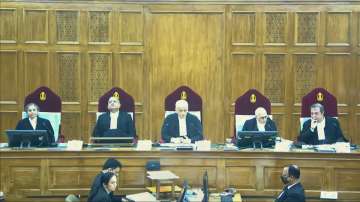The Supreme Court on Monday upheld the validity of the 103rd Constitution amendment, providing 10 per cent reservation to economically weaker sections (EWS) in the general category in admissions and government jobs. The scheme was introduced by the Modi government just before 2019 Lok Sabha elections.
-
The Supreme Court, by a majority view of 3:2, on Monday upheld the validity of the 103rd Constitution amendment providing 10 per cent reservation to people belonging to economically weaker sections (EWS) in admissions and government jobs. Three judges upheld the Act while two judges including CJI UU Lalit pass a dissenting judgement.
-
Supreme Court Justices Dinesh Maheshwari, Justice Bela M Trivedi, JB Pardiwala upheld the validity of the Constitution's 103rd Amendment Act 2019. However, Justice S Ravindra Bhat passed a dissenting judgement and disagrees with the majority verdict on upholding the validity of EWS reservation. CJI Lalit concurred with the view of Justice Bhat.
-
Justice Dinesh Maheshwari said reservation on economic criteria does not violate the basic structure of the constitution... EWS reservation does not violate the equality code.
-
EWS amendment does not violate the equality code or violate the essential features of the Constitution and the breach of 50% does not violate the basic structure, he added.
-
This amendment enabling state to make special provision for other than SC/ST should be treated as affirmative action by the parliament. The amendment as a separate class is a reasonable classification. They cannot be treated at par with citizens of general category. Such classification does not violate the equality code, Justice Trivedi said.
-
What is visualised in preamble and what is there in part 3 and 4, it cannot be called as violative of the basic structure. The identity test as propounded in Keshavannanda bharthi is not violated, Justice Trividi further said.
-
Justice JB Pardiwala said, "Reservation cannot be allowed to become a vested interest. It is to end social and economic inequality. The movement started 7 decades back and long-standing development and education has helped in minimising the gap. The ones who have moved ahead should be removed from backward classes so that ones in need can be helped. The ways to determine backward classes need a re- look so that ways are relevant in todays time.
-
Reservation should not continue for an indefinite time so that it becomes a vested interest, Justice JB Pardiwala said while upholding the reservation.
-
Justice Ravindra, who dissented with the judgment of the rest of the bench said, "Our constitution does not permit exclusion and this amendment undermines the fabric of social justice and thereby the basic structure. This amendment is deluding us to believe that those getting social and backward class benefit is somehow better placed. This court has held that 16(1) and (4) are facets of same equality principle."
-
The five-judge Constitution bench, headed by Chief Justice U.U. Lalit had reserved the judgment on September 27.
(With inputs from IANS)
ALSO READ | PM Modi expresses wish to break own election record in Gujarat
ALSO READ | BJP will win comfortably in both Gujarat and HP, says BJP chief JP Nadda at India TV conclave
Latest India News
